
Grants Section

Location: A714, Lab 3
Grants and Research Collaborations Section provides support for government-funded research grants and fellowships.

Tasks of Grants Section
- Providing information on governmental research grants and fellowships
- Grant writing support
- Post-award financial management
- Support for institutional application adn management of large-scale projects
For research grants by the private sector (private foundations, etc.), please contact the Business Development Section ( [email protected] ).

For currently opening calls, please refer to the "Grant Calls" page .

Major Research Grants
Jsps/mext kakenhi.
Funding Agency: JSPS (Japan Society for the Promotion of Science) , MEXT (The Ministry of Education, Culture, Sports, Science and Technology)
KAKENHI is the largest public research funding scheme that covers almost all research areas. Funding may vary from under 1.5 million to billions JPY per project. read more
JST CREST/PRESTO/ACT-X
Funding Agency: JST (Japan Science and Technology Agency)
CREST promotes world-class basic research to overcome critical challenges facing Japan and to create creative and outstanding seeds of innovative technologies that will contribute significantly to social and economic transformation. PRESTO promotes original, challenging, and internationally high-level pioneering basic research (solo-type) that has the potential to lead the world in the creation of seeds of innovative technologies. ACT-X encourages young researchers to pursue research based on their own original ideas and to establish their individuality as researchers by mutually inspiring each other and forming a network inside and outside of their research field. read more
AMED CREST/PRIME
Funding Agency: AMED (Japan Agency for Medical Research and Development)
With the goal of developing innovative drugs, medical devices, and medical technologies under R&D objectives determined by the government, AMED-CREST focuses on achieving world-class results aimed at generating innovative seeds, with the research conducted by a unit (a group of researchers).
PRIME aims to generate results that will spawn innovative seeds, with the research being independently conducted by the individual PI. read more
Fellowships for International Researchers
Funding Agency: JSPS
OIST faculty can use JSPS Postdoctoral Fellowships and/or Invitational Fellowships for Research in Japan to host postdoc fellows or invite established researchers to do collaborative research. For different fellowships and their requirements, please click "read more" below.
Fellowships for Japanese Researchers/Researchers with Permanent Residency
JSPS Research Fellowships for Young Scientists offers excellent young researchers (Japanese or those with permanent residency) an opportunity to focus on a freely chosen research topic based on their own innovative ideas. Ultimately, the program works to foster and secure excellent researchers. For different fellowships and their requirements, please click "read more" below. read more
Useful links
- Grant/ Fellowship Pre-submission Form
- e-RAD Registration/Update Request Form
- eAPRIN (CITI) Registration Webform (research integrity courses required for external funding application)
- Research Support Division
- Divisions and Offices
- Grants Search
- Manage Your Award
- NEH's Application Review Process
- Professional Development
- Grantee Communications Toolkit
- NEH Virtual Grant Workshops
- Awards & Honors
- American Tapestry
- Humanities Magazine
- NEH Resources for Native Communities
- Search Our Work
- Office of Communications
- Office of Congressional Affairs
- Office of Data and Evaluation
- Budget / Performance
- Contact NEH
- Equal Employment Opportunity
- Human Resources
- Information Quality
- National Council on the Humanities
- Office of the Inspector General
- Privacy Program
- State and Jurisdictional Humanities Councils
- Office of the Chair
- NEH-DOI Federal Indian Boarding School Initiative Partnership
- NEH Equity Action Plan
- GovDelivery
Fellowships for Advanced Social Science Research on Japan
Division of research programs.
THE DEADLINE FOR THIS CYCLE HAS PASSED.
Updated guidelines will be posted in advance of the next deadline. In the meantime, please use these guidelines to get a sense of what is involved in assembling an application.
Grant Snapshot
Maximum award amount, funding opportunity for, expected output, period of performance, application available (anticipated), next deadline (anticipated), expected notification date, project start date.
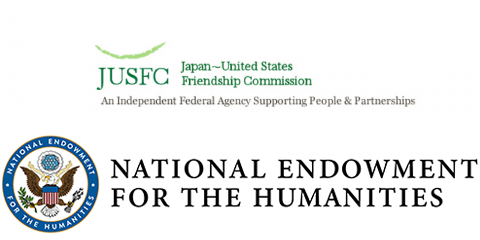
Applicants to NEH for awards with expected issuance dates on or after October 1, 2024, should be aware of revisions to the Uniform Administrative Requirements, Cost Principles, and Audit Requirements for Federal Awards (2 CFR Part 200) effective from that date. All NEH awards issued on or after October 1, 2024, will be subject to the revised regulations. Exemption Note: While awards to individuals do not include budgets, indirect costs, or single audits, broader revisions to 2 CFR 200 may be applicable.
Additional information is available at https://www.neh.gov/grants/manage/2024-Revisions-to-2-CFR-200
The Fellowships for Advanced Social Science Research on Japan program is a joint activity of the Japan-United States Friendship Commission (JUSFC) and the National Endowment for the Humanities (NEH). The goals of the program are to promote Japan studies in the United States, to encourage U.S.-Japanese scholarly exchange, and to foster the next generation of Japan scholars in the United States. Awards support research and writing on modern Japanese society and political economy, Japan's international relations, and U.S.-Japan relations. The program encourages innovative research that puts these subjects in wider regional and global contexts, is comparative and contemporary in nature, and contributes to scholarly knowledge or to the general public’s understanding. Appropriate disciplines include anthropology, economics, geography, history, international relations, linguistics, political science, psychology, and sociology. Awards may result in articles, monographs, books, e-books, digital materials, translations, editions, or other scholarly resources.
Special Encouragement for Junior Scholars
In keeping with the JUSFC’s commitment to foster the next generation of leaders in developing and maintaining the Japan-U.S. relationship, NEH encourages applications to this program from junior scholars (that is, scholars who have earned their terminal degree within the last seven years). Mid-career and senior scholars are also welcome to apply.
Watch a Recording of the Online Information Session
A live online information session for applicants was held on March 6, 2024. The session explained the program's goals, the eligibility requirements, and how to prepare and submit an application. To watch a recording, click here or on the image below. The main presentation lasts about 30 minutes. It is followed by a 30-minute question-and-answer period. The recording will remain available through the application deadline.
Read the Notice of Funding Opportunity to ensure you understand all the expectations and restrictions for projects delivered under this grant and are prepared to write the most effective application.
Application Materials
Fellowships for Advanced Social Science Research on Japan: 2024 Notice of Funding Opportunity
Fellowships for Advanced Social Science Research on Japan Grants.gov application package
Program Resources
Frequently Asked Questions, 2024 (PDF)
List of previously funded projects in this program
Sample Application Narratives
The Paralympic Movement, Sports, and Disability in Postwar Japan
Environmental Politics in East Asia
The Negotiation of Burakumin Identity in Contemporary Japan
When you are ready to apply, register for a Grants.gov account . If you already have registered, make sure the account is current. After registering, you must add an “individual applicant” profile. Click on the “My Account” link, then on “Manage Profiles” and “Add Profile.” Refer to Grants.gov’s instructions for adding a profile .
- Register with Grants.gov
- Grants.gov Applicant Registration Guidance
- Download Adobe Reader
- Tips for making PDFs
Follow the instructions outlined in the Notice of Funding Opportunity and the Grants.gov instructions.
You will receive a confirmation from Grants.gov when you've successfully submitted your application.
NEH will request letters of reference from your recommenders approximately seven to ten days after the application deadline. You will be notified by email when each of your letters of reference has been received. Once you receive final confirmation of receipt from Grants.gov, you may check the status of your letters by logging in to the secure area of NEH’s website. Enter your NEH application number and your Grants.gov tracking number. You will be able to see the names and e-mail addresses of your letter writers and whether their letters have arrived. If necessary, you may send reminders to your letter writers (including the upload link) from this site. You are responsible for ensuring that your letter writers have received the solicitations from NEH and submitted their letters.
Program Statistics
Examples of projects funded by this grant program.
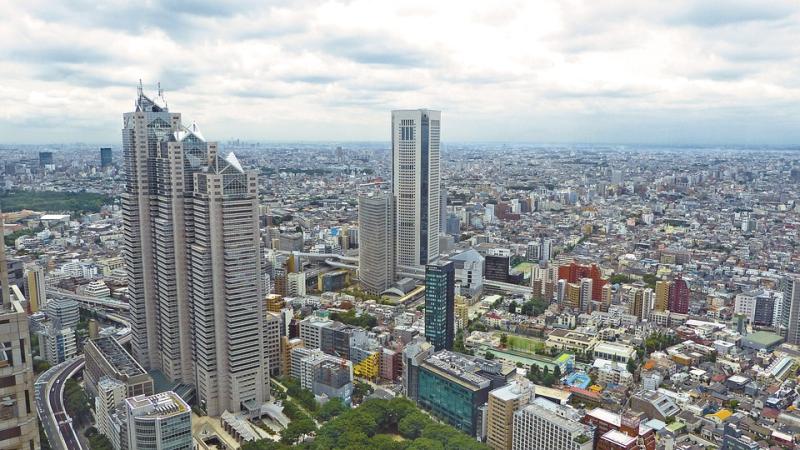
Beyond the Buraku: The Negotiation of Burakumin Identity in Contemporary Japan
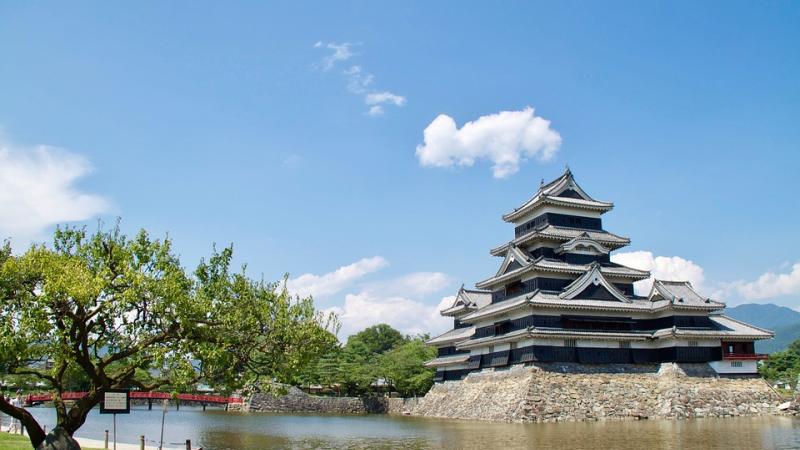
Geopolitics and Geopieties in 20th-Century Nagano
This website uses cookies to improve the user experience. If you continue on this website, you will provide your consent to our use of cookies.
- List of Executives
- Kyoto Prize
- Research Grants
Inamori Research Grants
- Application
- Social Contributions
- Wonder Hunter Project
- INAMORI Music Day
- Press Releases
- Research grants
About Inamori Research Grants
It is our belief that diversity and originality play key roles in nurturing genuine learning. The Inamori Research Grants Program supports researchers who come from diverse backgrounds and are working on proprietary research by granting 1 million yen to each researcher, thus providing opportunities to verify the feasibility of numerous ideas.
Seiwa Scholars Society
- Related News
The annual Inamori Research Grants Program was launched in 1985 to support research works by scholars in Japan with the aim of fostering human resources capable of contributing to the future of human society. Recipients are chosen from a wide range of research areas, across the fields of the natural, human, and social sciences. Grants are selected by a screening committee comprising leading authorities in the relevant fields of research. These elite scholars, chosen from among many applicants through a rigorous selection process, are expected to play leading roles in their respective fields.
- Natural Sciences
- Humanities and Social Sciences
- The age of 40 years or less as of April 1st, 2024 for the Natural Sciences, and 50 years or less for the Human, Social and Social Sciences
- Applicants must be researchers who reside in Japan, be affiliated with a university or an institution to which application information have been sent. They must also meet other requirements set by the Inamori Foundation.
- Amount Granted 1 million yen each to 50 recipients per year
- Use of Grants No restrictions, as long as use thereof is genuinely necessary for research purposes
- Length of grant period For one to two years
- Application Period From Early July to Late July
Find recipients
List of recipients
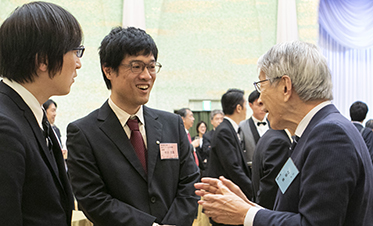
3S Meeting is an annual event held in spring. To interact with each other, lectures and poster presentations are given by 3S members, followed by a reception, to provide opportunities for members.
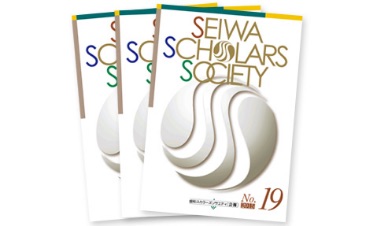
Magazines and Web Articles
An e-mail magazine called “3S Mail Magazine” is published several times a year. A web article called “Visiting 3S Researchers” is regularly posted on our website.

General Assembly
In accordance with the Society’s founding purpose, General Assembly is held in April each year. Lecture meetings and social dinners are held to promote friendship among members.

Seiwa Scholars Society Newsletter
This annual publication (Japanese only) is packed with a wide variety of information, opinions, and suggestions, aimed at facilitating members’ research activities through exchange and friendship among researchers in different fields.
-3S Mail Magazaine (Japanese only):
A members-only email magazine shares news about the members, including the latest research results and awards.
-Serial Article “Visiting 3S Researchers”:

Call for Applications for the 2025 Inamori Research Grants
The Inamori Foundation opened the applications for the 2025 Inamori Research Grants on July 1, 2024. The application is open until July 31, 2024, 17:00 (JST).
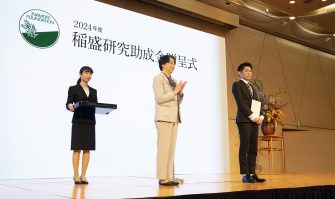
Inamori Research Grants Presentation Ceremony Held
On April 13, a ceremony was held at The Prince Kyoto Takaragaike (Sakyo-ku, Kyoto) for the Inamori Research Grant, which supports researchers in the natural sciences, humanities, and social sciences. The ceremony was followed by a social gathering for the Seiwa Scholars Society (3S), which aims to promote exchange among grant recipients.

The 2024 Inamori Research Grants 50 Recipients Selected!
The Inamori Foundation announced the 50 recipients of the 2024 Inamori Grants on March 8, 2024. Out of 408 applicants (natural sciences: 335; humanities and social sciences: 73), 40 from the field of natural sciences and 10 from the field of humanities and social sciences were selected through the rigorous selection.
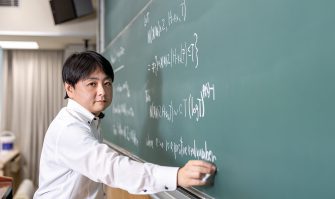
Visiting 3S Researchers #12 Dr. Sho Tanimoto What Motivates Mathematicians to Tackle Difficult Problems? —Towards a Proof of Manin’s Conjecture Concerning Rational Points on Geometric Figures—
On a geometric figure determined by an equation involving multiple terms and variables, how many rational points are there?—One of the most famous problems in an academic discipline that considers such questions is Manin’s Conjecture. Dr. Sho Tanimoto of Nagoya University, a researcher of Manin’s Conjecture, has delivered significant achievements in this field.
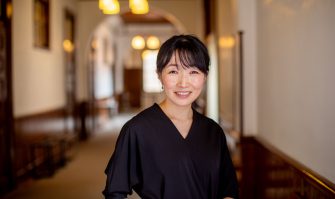
Visiting 3S Researchers #11 Dr. Akiko Miyamoto Illuminating the Process of Filmmaking through Archival Research ─Unveiling the Timeless Allure of Yasujiro Ozu for the Modern Age─
3S is the abbreviation for “Seiwa Scholars Society,” which consists of the past and current Inamori Research Grant recipients. The 3S has evolved since 1997 with the hope that the interactions among the various specialties of the 3S members can lead to the further development of the research of their own. In the series “Visiting...
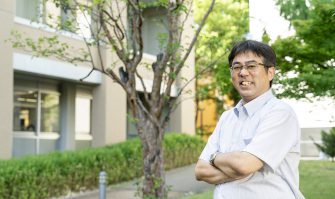
Visiting 3S Researchers #10 Dr. Masaya Oki On a Quest for a Vital Phenomenon that Holds the Key to Numerous Mysteries, from the Wonder of Twins to Treatment of Disease ─Visualizing the Epigenetic Process within a Single Cell as It Develops─
In the series "Visiting 3S Researchers," we interview researchers in 3S who are very active in a variety of fields. The tenth interview is with Dr. Masaya Oki (2008 Inamori Research Grant Recipient) from Graduate School of Engineering, University of Fukui.
InaRIS Inamori Research Institute for Science Fellowship
Scientific breakthroughs may be brought about by rigorously analyzing the least expected results. The InaRIS Fellowship Program grants 10 million yen per year over 10 years (totaling 100 million yen) to researchers engaged in investigations into topics with high potential based on a grand vision, providing them with opportunities to indulge themselves in research activities and pursue the possibility of triggering a quantum leap in science.
Funding Programs

As a network-based research institute, JST takes the initiative to promote research and development activities linked to innovation, and tackles economic and social issues through the practical application of its research output as well as international collaborative research.
Strategic Basic Research
Information platform and database services, etc., industry-academia collaboration and technology transfer, international collaborations, jst-mirai program.
This program promotes research and development from a basic research stage to a stage where industry can decide whether they could make a business successful (proof of concept: POC). To achieve it, we set goals focusing on clear targets which realize economic and social impact and challenge technological difficulties.
Strategic Basic Research Programs
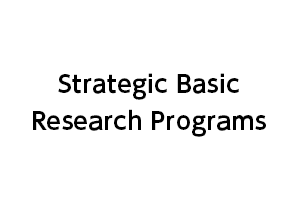
Strategic Basic Research Programs seek to build virtual research institutes (time limited research organizations spanning organizational boundaries) consisting of networks of researchers at universities, companies, and public research institutions. Researchers pursue their work, while building networks of other researchers, industrial concerns that will benefit from the fruits of research work, and interested parties in society at large, under the leadership of a Program Officer (Research Supervisor, etc.) performing the role of the institute director.
CREST (Core Research for Evolutional Science and Technology)
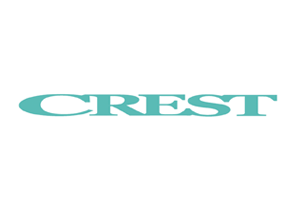
Based on management of the research area defined by the supervisor, we pursue researchers who have unique and stimulating ideas. We give aid to studies that aim for the creation of new values leading to innovations in science and technology. With advice and guidance from the research supervisor and area advisor, young researchers advance their research studies according to their unique ideas. As they communicate and form networks with researchers from different fields in and out of their research area, young researchers try to establish themselves in the field.
PRESTO (Precursory Research for Embryonic Science and Technology)
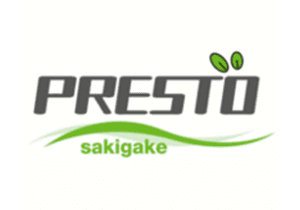
Under the management principles in the research area selected by the research supervisor as the manager in the research area, the young researchers selected by the research supervisor form a network with researchers in different research areas to promote a challenging individual-type research that is only accomplished by such young researchers.
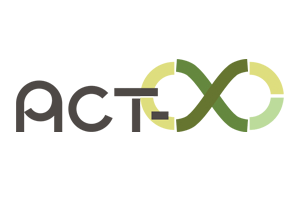
ERATO(Exploratory Research for Advanced Technology)
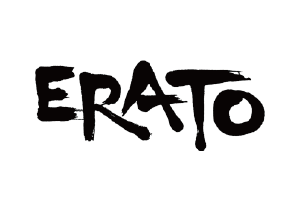
In line with the Strategic Objectives set by MEXT, JST identifies key Research Areas with high potential for generating the seeds of new technologies, then appoints Research Directors responsible for managing their own research area. They formulate their own detailed frameworks for research and they also recruit researchers to contribute to the realization of their research vision, leading their teams directly in the pursuit of this research. Participation and cooperation are drawn from a broad range of sources, including JST, industry, academia and government agencies, and may include overseas participation. Hence, this program encourages a collaborative structure and the management of joint projects.
ALCA-Next(Advanced Technologies for Carbon-Neutral)

This program promotes basic research on innovative technologies that are not just extensions of conventional technologies and that will bring about discontinuous innovation, with the aim of contributing to the realization of carbon neutrality by 2050.
CRONOS(Cutting-edge Research and Development on Information & Communication Sciences)

This program aims to contribute to an advancement of Japan's information and communication sciences through developing innovative technologies in the field and fostering researchers with unique ideas and conceptual skills. It sets challenging goals ("Grand Challenges") with the ultimate objective of bringing about paradigm shifts in information and communication sciences in promoting research. With the Grand Challenges and a flexible scheme that enables integration of basic and applied research, we promote research that leads to a transformation of society, and target to achieve proofs of concept.
RISTEX(Research Institute of Science and Technology for Society)
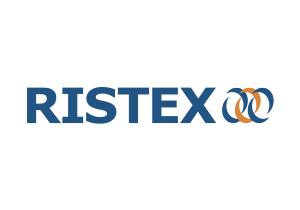
RISTEX promotes R&D for resolving practical issues in the society and ethical, legal and social issues/implications (ELSI) of science and technology, by the collaboration between researchers and various stakeholders. RISTEX contributes to the achievement of SDGs and the building of the appropriate relationship between science, technology and society, by producing outputs useful in resolving problems in the real world and engaging in the pursuit with a strong emphasis on social implementation. RISTEX also promotes the “Future Earth” initiative which is an international framework for the engagement in global environmental problems.
SOLVE for SDGs:Solution-Driven Co-creative R&D Program for SDGs
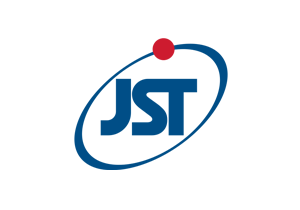
For the purpose of contributing for achieving the SDGs, JST will promote a solution-driven R&D program in a co-creative manner involving multi stakeholders from various sectors. JST will clarify social issues and bottlenecks, create scenarios and solutions (case examples) to the issues in a holistic manner using scientific methodology based on natural sciences, social sciences and humanities.
Moonshot Research and Development
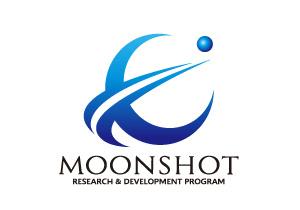
JST is driving high risk, high impact R&D towards ambitious and attractive targets (Moonshot targets, determined by the Council for Science, Technology and Innovation (CSTI)) to solve issues facing future society.
BOOST (Broadening Opportunities for Outstanding young researchers and doctoral students in STrategic areas)
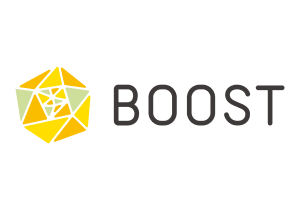
BOOST is a program for developing highly urgent national strategies. This is a program that promotes human resource development and cutting-edge research and development in the field to improve Japan's international competitiveness radically.
DICP:Database Integration Coordination Program
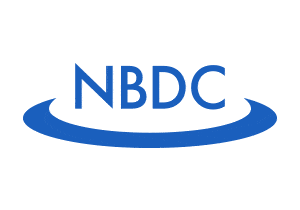
The Database Integration Coordination Programis a program to develop databases which collect research data and utilize them in an integrated manner in life science.
COI-NEXT (Program on open innovation platform for industry-academia co-creation)
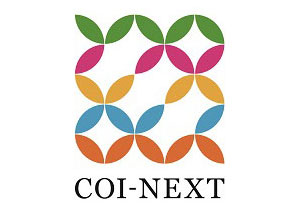
Reflecting upon the effects of the Covid-19 pandemic, this program puts forward the vision of a future society based on the SDGs and realizes it through collaboration from industry, academia and the government, with universities being the main driving force. This program will help form centers of excellence that promote backcasting R&D which creates new economic and social values as well as generation and sustainable management of industry-academia co-creation system which supports such backcasting R&D.
OPERA(Program on Open Innovation Platform with Enterprises, Research Institute and Academia) [Japanese text only]

In order to promote new major industries in this program, industry and academia collaborate on planning a “technology and system innovation scenario”, and the program promotes R&D based on this scenario executed by their tight collaboration. we aim to enhance industry-academia partnership concerning basic research and human resources development, and to develop open innovation in our country.
A-STEP (Adaptable and Seamless Technology Transfer Program through Target-Driven R&D)
This program supports industry-academia collaborative R&D across a wide range of phases to develop commercial applications of research output generated by basic research. Several types of funding are provided under this program, depending on the characteristics of each R&D phase.
NexTEP(Newly extended TEchnology transfer Program)
Companies have their own business plans based on university's research results, yet many are not executed due to the developmental risk. NexTEP aims to accelerate commercialization by supporting company's large-scale practical development and obtain the sustainable business growth.
START (Program for Creating STart ups from Advanced Research and Technology)
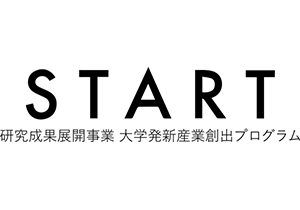
"START" is a program to support R&D and commercialization integrally to create start-ups with the support of "Project Promoters" (venture capitals). Another program called "SCORE" provides practical training opportunities of testing and improving business model hypothesis for verification of the possibility of start-ups.
SUCCESS (SUpport program of Capital Contribution to Early-Stage companies)
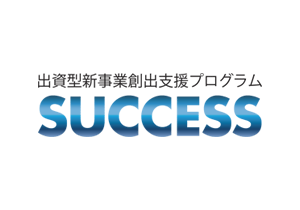
“SUCCESS” is to invest in start-up companies which attempt to translate the outputs from JST-funded R&Ds into practical application. Not only seed money but also supports from human and technical points of view can be offered to these companies.
Intellectual Property Utilization Support Program
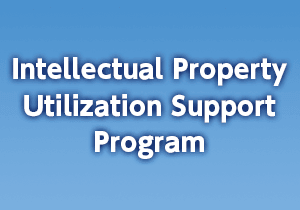
JST offers support for the acquisition of rights for the results of university research, along with support for universities' intellectual property (IP) management, packaging, licensing to companies, and opportunities for matching between industry and academia, as well as training of technology transfer personnel. JST aims at contributing to the creation of innovation through comprehensive support for intellectual property management initiatives at universities and other organizations, technology transfer, and industry-academia collaboration activities.
Converting Research Output to IP
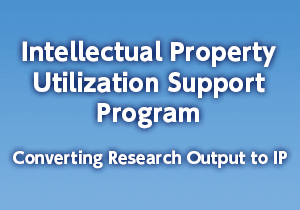
JST supports the acquisition of foreign patents by universities-self for applications for patents with a high likelihood of technology transfer activities or patent utilization in the future. JST provides comprehensive support for PCT applications and transfers to designated countries, including assistance with expenses and expert opinions from JST intellectual property specialists.
Patent Consultation for Universities
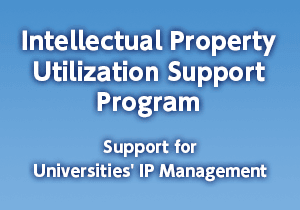
JST provides patent strategy consultation, invention consultation, and support to strengthen universities' IP management.
Collection of University Patents
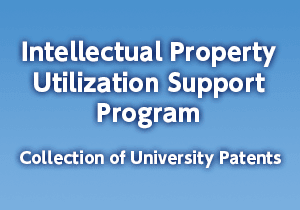
JST collects university patents for which there are expectations of technology transfer and innovation creation, but which are difficult to hold singly, receiving their transfer on a paid basis in anticipation of the outcome, and works to actively promote their utilization.
Super Highway
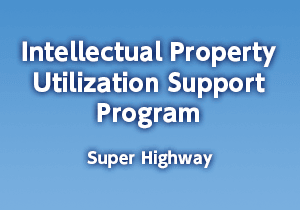
Among the collected patents, for those with high technological superiority and which are expected to have a substantial socioeconomic effect, JST secures rights to the (peripheral) technologies required for commercialization in conducting proof of concept (demonstration testing). JST works to enhance attractiveness to companies as a patent package, and to achieve early utilization.
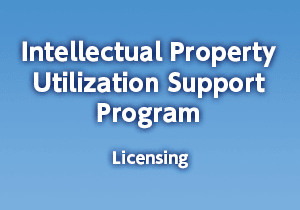
In order to facilitate commercialization of the research output originating from universities, public research institutions and JST programs, JST undertakes licensing activities.
Innovation JAPAN: University Technology Exhibitions
To provide opportunities for matching high-quality technology seeds with the needs of industry, JST organizes a national-scale university knowledge fair named “INNOVATION JAPAN: University Technology Exhibitions.”
New Technology Presentation Meetings
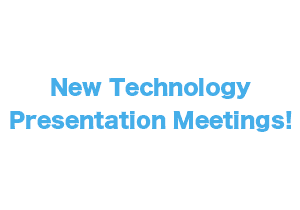
Inventors explain their new technology at new technology presentation meetings, and researchers at universities present their own perspectives on the potential for commercial applications for their new technologies to companies.
Open Innovation Seminars Communicating the Needs of Companies to Universities
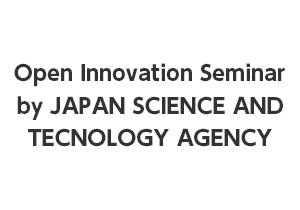
At Open Innovation Seminars, companies can present their research-related needs to universities, including issues that require short-term solutions and companies wishing to conduct collaborative research with universities.
Portal Site for Industry-Academia-Government Collaboration
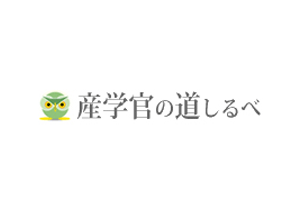
This information portal site aims to provide a comprehensive range of information relating to industry-academia-government collaboration for those who engage in these activities.
Industry-Academia-Government Collaboration Support Database
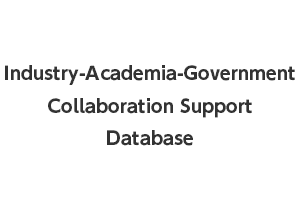
This valuable online database provides all parties involved in industry-academia-government collaboration with an extensive range of information.
Human Resource Development Program for Technology Transfer
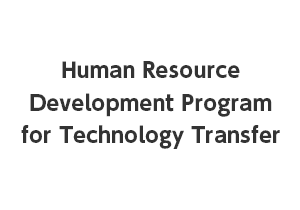
We conduct research aimed at increasing the specialist knowledge of smart human resources involved in technology transfer work with universities and foundations, and at building people networks.
ASPIRE (Adopting Sustainable Partnerships for Innovative Research Ecosystem)
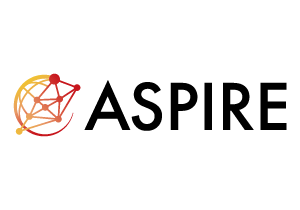
This program is an initiative to develop and strengthen Japan's scientific and technological capabilities through supporting international joint research in scientific and technological fields of strategic priority, while simultaneously promoting researcher mobility in the Japanese research community by connecting top researchers from Japan and other leading countries and regions in scientific research.
SATREPS (Science and Technology Research Partnership for Sustainable Development)
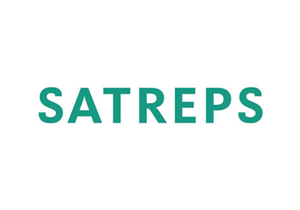
SATREPS is an international research program conducted in collaboration with JICA, which provides official development assistance (ODA). Based on the needs of developing countries, this program aims to address global issues and to produce research outcomes of practical benefit to both local and global societies.
SICORP(Strategic International Collaborative Research Program)
We support large-scale international research collaboration on an equal-partnership basis, with partner countries and regions and in research fields designated through interministerial agreement.
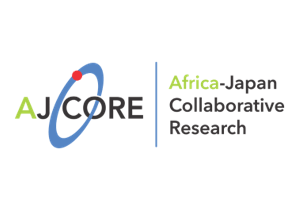
AJ-CORE (Africa-Japan Collaborative Research) is a multilateral research framework connecting three (or more) countries: Japan, South Africa, and at least one African country. Researchers from other African countries will cooperate on an equal-partnership basis with those from Japan and South Africa, together contributing to issues of local and global significance.
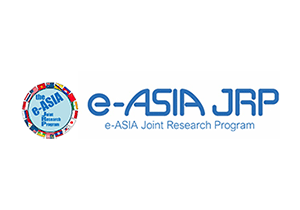
The e-ASIA Joint Research Program (e-ASIA JRP) is an international joint initiative between public funding organizations of the East Asia Summit member countries. With a central focus on Southeast Asia, the e-ASIA JRP co-funding mechanism aims to strengthen regional research and development capabilities and resolve common challenges in the region.
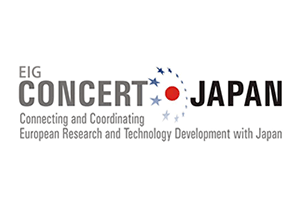
EIG CONCERT-Japan
CONCERT-Japan began as a platform for international research cooperation activities under the EU's Seventh Framework Programme for Research and Technological Development (FP7). After the conclusion of the FP7 iteration in December 2014, its activities continued under the new European Interest Group (EIG) CONCERT-Japan name with 13 science, technology and innovation (STI) funding agencies from 11 European countries and Japan (as of 2019) partnering to further research collaboration and exchange. Through STI policy knowledge sharing, research exchange, network building and joint funding calls, the program supports Japanese-European research collaboration in a variety of fields.
BELMONT FORUM
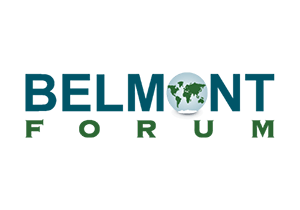
The Belmont Forum gathers the world's major and emerging funders of global environmental change research and international science councils to mobilize and coordinate resources towards its mission of advancing environmental sustainability research. The Forum works closely with the scientific community as well as other key actors such as the Future Earth initiative.
International Symposia
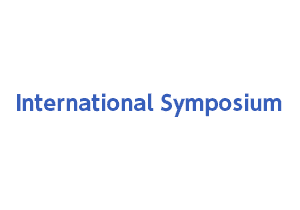
In addition to supporting joint research with other countries, JST also engages in various international exchange activities including workshops and programs and programs to promote the exchange of young researchers.
Collection of science and technology information from overseas
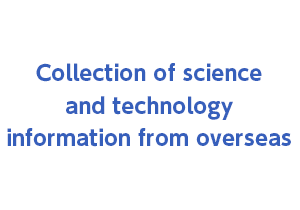
Promoting science and technology cooperation at an early stage in fields that will become prominent in the future, fostering exchange especially among young researchers and creating networks are all extremely important activities for the development of science and technology in Japan. For this reason, JST is collecting information related to overseas science and technology through the Infrastructure Development for Promoting International S&T Cooperation program.
Sakrua Science Program
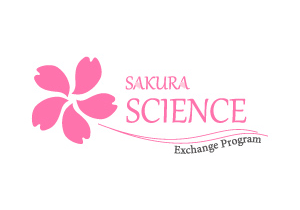
With close collaboration among industrial, academic and governmental institutions, this program offers opportunities for excellent young scientists from overseas to visit Japan
Accommodation for foreign researchers
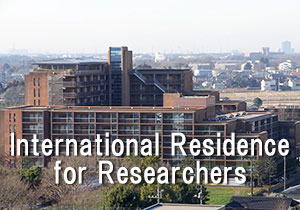
To further promote international exchange, JST operates accommodation (“Ninomiya House”) in Tsukuba, available for use by visiting researchers.

Promotion of international policy dialogue contributing to the development of science and technology diplomacy
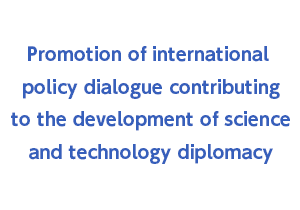
JST supports international meetings and other activities to promote discussion about the future of science and technology involving a wide range of leading stakeholders from industry, academia and government. (Japanese text only)
NEXUS (Networked Exchange, United Strength for Stronger Partnerships between Japan and ASEAN)
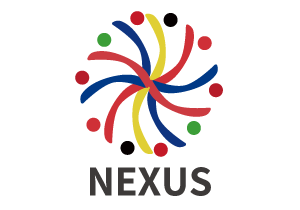
NEXUS is a flexible and multi-layered cooperative framework, leveraged by the long history of science and technology cooperation between both sides with the opportunity of the “50th anniversary of friendship and cooperation between Japan and ASEAN.” It is aimed to further strengthen the cooperative research relationship between Japan and ASEAN as partners in co-creating innovations in science and technology.
- Japan-U.S. Educational Commission
Grants for Japanese
- Grants for Americans
- List of Grantees
Below is an English translation summary of the official information provided in Japanese. For the complete information, please refer to the Japanese version.
The Japan-United States Educational Commission (Fulbright Japan) offers approximately 30 to 40 Fulbright grants for Japanese citizens to study or conduct research in the U.S. in the fields listed below.
All awards are subject to budget appropriations from the governments of Japan and the United States. Grants are for the 2025-2026 JUSEC program year.
A Fulbright award cannot be held simultaneously with another grant intended for the same purpose, nor can it be postponed in order to first accept another grant intended for the same purpose.
Fields of Study
The Commission provides grants to Japanese applicants for proposed study or research in the United States in:
●Humanities ●Social Sciences ●Natural Sciences ●Applied Sciences (includes Engineering)
‐ Applicants proposing interdisciplinary study or research between any of the above fields are also eligible for grants.
‐ Applicants must have interests in American culture and society in the broad sense, not limited within their proposed fields of study or research.
‐ Applicants demonstrating study or research plans/goals that are strongly related to furthering mutual understanding and cooperative pursuits between Japan and the United States will generally be preferred over those who lack such intent.
Note: The Fulbright Program is not appropriate for students and scholars wishing to pursue projects/ programs involving graduate medical education or training at accredited U.S. schools of medicine or scientific institutions. The Fulbright Program is also not appropriate for unsupervised research or academic study involving direct contact with human or animal patients, subjects, or specimens.
Eligibility requirements for ALL applicants
- Citizenship: Applicants must be citizens of Japan. Persons holding dual Japan-U.S. citizenship or permanent U.S. residency are NOT eligible for Fulbright grants to the U.S.
- Residency in Japan: Applicants must be residing in Japan as of July 1, 2024.
- English proficiency: Sufficient English proficiency to pursue proposed activities in the U.S. In principle, interviews will be conducted in English. If judged necessary, successful candidates may be required to pursue language study at their own expense before departure.
- Applicants must have interests in American culture and society in the broad sense, not limited within their proposed fields of study.
- Health Condition: Submitting a health report and obtaining medical clearance is required for all successful candidates; however, submitting the report at the time of application is unnecessary.
*The following persons are NOT eligible:
- Individuals who are currently studying (including language study), researching or lecturing at U.S. universities.
- Individuals who plans to start studying (including language study), researching or lecturing at U.S. universities as of July 1, 2024 and before the 2025 fall term.
- Individuals who have resided in the U.S. for five or more consecutive years in the six-year period preceding the date of application (July 1, 2024). For the purpose of this section, an individual who has lived in the United States for nine months or more during a calendar year is deemed to have resided in the U.S. for that year.
- Individuals who plan to stay overseas for longer than 90 days within the period from July 1, 2024 to the grant start date.
- Board members and employees of the Japan-U.S. Educational Commission and their immediate families.
- Employees of the U.S. missions abroad who work for the U.S. Department of State or the U.S. Agency for the International Development and their immediate families.
- Officers of an organization, in the United States or abroad, including members of boards of trustees or similar governing bodies, and individuals otherwise associated with the organization, wherein the organization and the individuals are responsible for nominating or selecting individuals for participation in any exchange program of the Bureau of Educational and Cultural Affairs.
Two-year home-country residency requirement
An exchange visitor (J-1) visa will be provided to all Fulbright grantees and will be required to return to Japan upon completion of their academic project and to reside in Japan for an aggregate of two years. Unless this requirement is fulfilled, they are not eligible to apply for an immigrant visa, for permanent residence, or for a non-immigrant visa as a temporary worker ("H" visa) or trainee, or as an intra-company transferee ("L" visa) to re-enter the United States. This does not preclude the individual from going to the United States on other visas during the two-year period. This U.S. law is under section 212(e) of the Immigration and Nationality Act.
Second Fulbright Grant
As a general matter, preference for Fulbright opportunities will be given to candidates who have not previously received a Fulbright grant.
Any misrepresentation (e.g., falsification or plagiarism) included in the application forms or documents will result in immediate disqualification and termination from the program.
Grant Categories
1. graduate study program.
This grant is intended to provide an opportunity for students who have outstanding academic and personal traits, and fully understand the purpose and objectives of the Fulbright Program, to study at a U.S. institution of higher learning for the purpose of obtaining a Doctoral or a Master's degree.
2. Doctoral Dissertation Research Program
This grant is intended to provide an opportunity for outstanding students and researchers who are seeking a doctoral degree from a Japanese university to conduct doctoral dissertation research at a U.S. institution of higher learning.
3. Research Program
This grant is intended to provide an opportunity for non-degree research in Social Science and Humanities for university faculty and professionals of non-profit organizations to develop their academic and professional expertise in collaboration with American colleagues and through auditing of graduate seminars.
4. Journalist Program
This grant is intended to provide an opportunity for non-degree research to practicing journalists who wish to enhance their professional expertise at a U.S. institution of higher learning or research facility, in one of the fields of study as outlined previously. This grant is NOT for the study of journalism techniques or theories. Upon returning to Japan, grantees are expected to publish articles in Japanese newspapers/periodicals relating to their U.S. experience.
5. Fulbright Foreign Language Teaching Assistant (FLTA) Program
The grant is intended to provide an opportunity for potential teachers of English to refine their teaching skills, increase their English language proficiency and extend their knowledge of the society and culture of the U.S., by serving as teaching assistants or primary instructors in the Japanese language classes at university in the U.S. FLTAs are required to enroll in two courses per semester.
6. Fulbright Scholar-in-Residence (S-I-R) Program
U.S. institutions apply to the Institute of International Education (IIE) to host a Fulbright Scholar-in-Residence for either one semester or an academic year. https://www.cies.org/program/fulbright-scholar-residence-program
Schedule (for the Grant Categories 1-4 above)
Applicants must submit the required documents in accordance with the schedule outlined below.
Shortlisted candidates will be invited for an online interview conducted in English by a panel of experts. Based on the recommendations made by the selections panel, the Commission selects the candidates and submits their names for final approval to the J. William Fulbright Foreign Scholarship Board (FFSB) in the U.S. Grants become effective when the commission confirms the candidate's university or institutional affiliation in the U.S.
| February 2024 | Competition announcement |
|---|---|
| March 1, 2024 | Registration start |
| May 1, 2024 | Registration Deadline |
| July 1, 2024 | Application Deadline |
| August - September 2024 | Documentary screening by specialists |
| September - October 2024 | Online interviews in English |
| November 2024 | Notification of candidacy |
| After July 2025 | Departure for the U.S. |
Japan-U.S. Educational Commission (Fulbright Japan)
Sanno Grand Building 207, 2-14-2 Nagata-cho, Chiyoda-ku, Tokyo, Japan 100-0014
- Related Links
- Current/Upcoming Events
- Past Events
- Online Contents
- Arts & Cultural Exchange
- Japanese Studies
- Global Partnerships
- Performance
- Cultural Events
- Japanese Arts in Latin America (JAILA)
- Grants for Arts & Cultural Exchange
- Projects Organized by JFNY
- Japanese Studies Survey
- American Advisory Committee (AAC)
- Grants for Japanese Studies
- Why Study Japan?
- Illuminating Japanese Studies: Online Lectures
- Grants for Global Partnerships
- Japan Outreach Initiative (JOI) Program
- US-Japan Network For The Future
- Abe Fellowship Programs
- Mask Up 2020
- Other Programs
Japanese Studies Fellowship Programs
| Proposal deadline | December 1, 2023 |
|---|---|
| Funding opportunity | Projects must be in the humanities, social sciences, and/or comparative research |
| Benefits | Includes airfare, certificate of health, insurance, settling-in and departure allowances, monthly stipend, dependent allowance and insurance, and, enrollment fees (may vary depending on program) |
This program provides support to outstanding scholars, researchers, and professionals in the field by offering the opportunity to conduct research in Japan.
NOTE : For applicants who are non-U.S citizens or permanent residents, please visit the Japan Foundation Headquarters .
2024-2025 Fellowship Categories
| Research Fellowship (Long-Term) | Research Fellowship (Short-Term) | Doctoral Fellowship |
|---|---|---|
| For research projects
More than 4 months, up to 12 months in length | For intensive research projects
21 days to 89 days in length | For doctoral research projects
4-12 months in length |
| Applicants must hold a Ph.D. or equivalent professional experience. | Applicants must hold a Ph.D. or equivalent professional experience. | Applicants must have achieved ABD status by the time the fellowship begins. |
Application deadline : 11:59pm EST on Friday, December 1, 2023
(Please note: different application processes apply to applicants who do not hold American citizenship, permanent residency or Americans with permanent residency in other countries. Please see “3. Eligibility” in the Application Guidelines and Instructions)
Notification of results : Principal awardees will be notified of the results in April, 2023 through the Japan Foundation, New York. Alternate awardees will be notified as fellowships become available.
Specialists and/or professional practitioners of Japanese art who wish to conduct short-term research in Japan should apply to the Ishibashi Foundation/The Japan Foundation Fellowship for Research on Japanese Art .
Guidelines and Login
Application Guidelines and Instructions (PDF) (PLEASE READ THESE BEFORE CREATING AN ACCOUNT) Read carefully to make sure you meet all eligibility requirements and understand application guidelines and instructions.
Create Account To access the Fellowship Application form, click below to create an account. (please note this link will redirect you to an external website from the JFNY website.)
Frequently Asked Questions
This list of FAQs covers common questions about the Japanese Studies Fellowship Programs. Fellowship Program FAQs (PDF)
Lists of Past Awardees
For past recipients of the Japanese Studies Fellowship, please click here .
For further inquiries, please contact: [email protected] or (212) 489-0299
Assessment Materials for FY2024 (part) have been registered(4th July 2024)
Database of Grants-in-Aid for Scientific Research(KAKEN) is a public database which includes information on adopted projects, assessment, and research achievements from the Grants-in-Aid for Scientific Research(KAKENHI) Program. This system is hosted by the National Institute of Informatics (NII)in cooperation with MEXT and JSPS.
We have enhanced the search function of the KAKEN database to make it easier to search for information on International Joint Research projects
https://support.nii.ac.jp/en/news/kaken/20211227-0
| Research Project Title | Project/Area Number | ||||
|---|---|---|---|---|---|
| Project Type | |||||
| Research Category | |||||
| Allocation Type | |||||
| Review Section/Research Field | |||||
| Research Institution | |||||
| Project Period (FY) | 〜 | ||||
| Total Cost (Overall) | |||||
| Project Status | |||||
| Keywords | |||||
| Research Abstract | |||||
| Name | |
|---|---|
| Affiliation | |
| Researcher Number | |
| Role |
| Report Type | |||||
|---|---|---|---|---|---|
| Assessment/Verification Type | Assessment Rating | ||||
Research Products Information
| Research Products Type | |||||
|---|---|---|---|---|---|
| Publications | |||||
| Published in Japan/Overseas | Identifier (ISSN, ISBN, etc) | ||||
| Int'l Joint Research | |||||
| Country Name | |||||
| Counterpart Institution | |||||
| Year | |||||
Selected Research Category
Selected review section/research field, selected research institution, selected report type, selected country name.
Information User Guide FAQ News Terms of Use Attribution of KAKENHI
Search form

Local Research for Better Lives
- Subscribe to GDNews
- Who's Who
- Biodiversity
- Doing Research
- Fiscal Policy
- Savoirs Sahel
- Annual Conference
- Completed Programs
- Program Archives
- Map of GDN Grants
- Partners & Funders
- Regional Networks
- Friends of GDN
- GDNews Newsletter
- Working Papers
- Annual Reports
- GDN Brand Guidelines
- GDN Experts
- In the News
- Press Releases
Japanese Award for Outstanding Research on Development (ORD) 2022
You are here.

The Japanese Award for Outstanding Research on Development is a competitive research grant program under the umbrella of the Global Development Awards Competition (GDAC) , administered by GDN, funded under the Policy and Human Resources Development Fund (PHRD) trust fund managed by the World Bank, and generously supported by the Ministry of Finance, Government of Japan. This award program identifies and funds outstanding research proposals in low- or middle-income countries with high potential for excellence in research and clear policy implications for addressing development issues.
The three winning projects will receive grants worth US$ 60,000 . The awards will be given to the researcher(s) whose proposals hold the greatest promise for improving our understanding of development issues and puts forth clear, articulate and well researched policy implications to address relevant developmental problems.
The first prize winner will receive a grant of US$ 30,000 . The second prize and third prize winners will receive a grant of US$ 20,000 and US$ 10,000, respectively . The funds will be used to support the research work proposed by the winners towards the completion of their research. Additionally, awardees will be paired with world-class academic in their area of work who will play the role of a Scientific and Technical Advisor.
Finalists will be invited to join a communications training in preparation of a pitch of their project in front of a high-level Jury, which will decide which research proposal to award, at a physical event in March/April 2023 (details to be defined) and projects are expected to start in May 2023. In case social distancing policies do not make travelling possible, the event will be held in a virtual setting.
GENDER BIAS
GDN recognizes the imbalance in the opportunities provided to women in professional research, as well as the consequences of unconscious gender bias in review processes in environments across the world. GDN also recognizes the impact these factors can have on the prospects of women researchers in securing awards and funding.
Starting with the 2022 edition, GDN is planning to embed more equitable grant-making processes to guarantee that more women have the opportunity to compete and win while still maintaining a high-quality standard on the evaluation. Therefore, GDN will institute a selection process for GDAC where we will make all efforts to guarantee gender representation amongst the 3 finalists of the ORD category.
We are taking this step in parallel to a revamped Capacity-building Framework for individuals or NGOs that are interested in GDAC since we will aim to support them regardless of their success in the review process. This means that we will develop activities for prospective applicants, grantees, and past grantees so that they develop some skills useful for other competitions or endeavors. We hope this will contribute to building capacity and empowering southern researchers including women.
CONNECTOR GRANT
The 2022 edition will introduce the Connector Grant which aims to stimulate international cooperation through the development of collaborative projects to support scale-up efforts with research-based evidence. The Connector grant will be awarded to ORD grantees, based on a project developed in collaboration with the MIDP grantees who received the JSDF grant. This grant will support the award recipients’ collaborative efforts towards measuring and analyzing scale-up impact, as well as to enhance the robustness of their M&E activities. The application to this grant will only take place after the full implementation of the funded ORD project and will not be part of the selection of the ORD winners.
ORD WINNERS
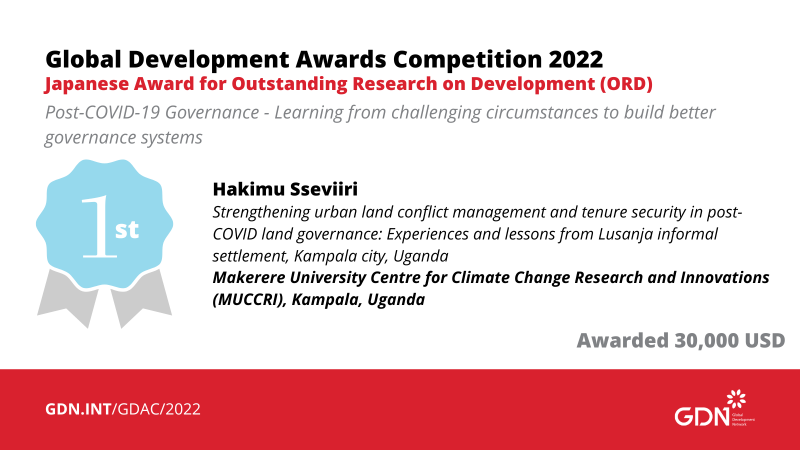
The first prize winner will receive a grant of US$ 30,000. The second prize and third prize winners will receive a grant of US$ 20,000 and US$ 10,000, respectively. The funds will be used to support the research work proposed by the winners towards the completion of their research.
Awardees will be paired with world-class academic in their area of work who will play the role of a Scientific and Technical Advisor and will be chosen in coordination with GDN.
View the recording of the public session where the finalists presented their proposals .
Call for ORD Proposals I Application Template I FAQs
Interested in the development projects’ category of GDAC? Check the 2022 edition of the Japanese Award for Most Innovative Development Project (MIDP) .
- INDIA : 2nd Floor, West Wing ISID Complex, 4, Vasant Kunj Institutional Area, New Delhi-110070 | INDIA
- EUROPE : 63 Boulevard François Mitterrand - CS 50320, 63009 Clermont-Ferrand Cedex, France
- USA : CliftonLarsonAllen LLP, 901 N. Glebe Road, Suite 200, Arlington, VA 22203, USA
- +91 11 4323 9494 [email protected]

- Pre-College Education
- Communication & Public Opinion
- US-Japan Policy Studies
- US-Japan Leadership Program
- Elgin Heinz Teacher Award
The United States-Japan Foundation is currently accepting applications for 2024 grants. The deadline for submitting letters of inquiry (LOIs) is Friday, June 28, 2024. We will announce final decisions by Monday, December 2.
Please email your LOI to [email protected] .
We would like to stress that these are deadlines, and we are willing to consider applications on a rolling basis. If you submit your LOI earlier in the year, we will try to review it sooner and provide you a response before December.
We are open in particular to giving expedited consideration to time-sensitive projects. If you feel yours meets that criterion, feel free to submit your LOI anytime, explaining in clear, concrete detail why you believe your application requires more immediate attention.
We are committed to a clear, transparent grant process, including a timely response to all communications. If you have any concerns, feel free to reach out directly to our president, Jacob Schlesinger, at [email protected] .

- Privacy Policy
- Language 日本語 English Deutsch
Research Grants
- List of Grant Recipients and Reports
- Research Papers
Fiscal Year 2024 Research Funding Application
Purpose of the funding.
How have youth culture and lifestyles in Japan and Europe (German-speaking areas) changed in recent years due to the rapid progress of globalization and information technology, and what developments can be expected in cultural exchange between the two regions in the future?
To investigate these questions, we support researchers in Japan and Europe (German-speaking areas) in their research into youth culture and lifestyles, foster the development of researchers who will play a central role in the cultural exchange between the two regions, and aim to develop a new academic field by making research results available to a broader audience through symposia, workshops, and publications.
Research theme
“Research on Youth Culture and Lifestyles in Japan and Europe (German-speaking areas)”
- (1) Trends in culture and consumer activities surrounding fields such as film, music, manga, and art
- (2) Trends in daily-life features such as fashion, eating habits, and residential preferences
- (3) Changes in lifestyles surrounding areas such as child raising, work, love, and marriage
- (4) Changes in social perceptions and movements relating to issues such as immigration, minorities, gender, and environment
Funding eligibility
- (1) Eligible are both individual research and group research.
- (2) No restrictions apply to the nationality and affiliated institutions of applicants and research members. However, all researchers must be resident in Japan or Europe (German-speaking areas) and must be under 40 years of age as of January 31, 2024.
- (3) Eligible to receive funding is research in the field of human and social science consistent with the research theme.
- (4) Research already completed is not eligible to receive funding. Moreover, applications are ineligible to receive funding in the following cases. ・When funding is to be allocated to the funding of activities and normal operations such as of NPO corporations ・When the purpose of funding is limited to purchasing goods and materials
- (5) As a general rule, researchers are responsible for their research results. The Foundation accepts no liability for the content of research results. Impropriety will be made public.
Application closing date ・Funding decision ・Submission and publication of reports
- Application closing date: January 12, 2024 (Friday) → January 31, 2024 (Wednesday)
- Funding decision : Scheduled for February to March 2024 (Decisions will be posted on the website of the Foundation)
- Submission of the research results report : March 2025
- Publication of the research results : Participation in a symposium held in Japan (planned for Kyoto) in March 2025 and presentation of research results *Online participation is also possible.
Funding amount and funding period
- (1) Funding amount JPY 300,000 per research (*2,350 € per project for applicants living in Europe) Number of funding awards: 4 (prospective)
- (2) Funding period The 10 months from April 1, 2024 to January 31, 2025
For details, please visit the website of the Foundation and read through “Fiscal Year 2024 Research Funding Application Requirements”
Application Requirements
Application form.
The Mitsubishi Foundation (Mitsubishi Zaidan)
| Address | 2-3-1 Marunouchi, Chiyoda-ku Tokyo 100-0005 |
|---|---|
| Telephone | 03-3214-5754 |
| Facsimile | 03-3215-7168 |
| ') /*]]>*/ | |
| URL | |
| Date established | 1969/09/11 |
| Founded by | A group of 40 enterprises of the Mitsubishi Group and other enterprises |
Established with an endowment from the Mitsubishi group of enterprises to commemorate the centennial of Mitsubishi.
To enhance science, education, culture and welfare in Japan by awarding grants for activities related to academic research, social welfare, and cultural property conservation.
LIMITATIONS
Applications from non-Japanese overseas not accepted because the Foundation has no programs for non-Japanese overseas; in special circumstances, inquiries from non-Japanese written in Japanese may be accepted; inquiries for scholarships not acceptable, because the Foundation has no programs for scholarships in Japan and abroad at present.
ORGANIZATION
| Representative | Kanetsugu Mike, President |
|---|---|
| Principal officer | Hiroaki Shichijo, Executive Director |
| Secretariat | Hiroaki Shichijo, Executive Director |
FINANCIAL DATA
| Fiscal Year | 2022(22/04/01-23/03/31) |
|---|---|
| Assets | ¥32,986,140,609 |
| Grants | ¥608,000,000 <2022> |
GRANT PROGRAMS
1.research grants in the natural sciences, grant totals, 2.research grants in the humanities, 3.grants for social welfare activities.
To the head of this page

Copyright © THE MITSUBISHI FOUNDATION. All Rights Reserved.
Thank you for visiting nature.com. You are using a browser version with limited support for CSS. To obtain the best experience, we recommend you use a more up to date browser (or turn off compatibility mode in Internet Explorer). In the meantime, to ensure continued support, we are displaying the site without styles and JavaScript.
- View all journals
- Explore content
- About the journal
- Publish with us
- Sign up for alerts
- 04 July 2024
Japan’s scientists demand more money for basic science
- Anna Ikarashi 0
Anna Ikarashi is a science writer based in Salt Lake City, Utah.
You can also search for this author in PubMed Google Scholar
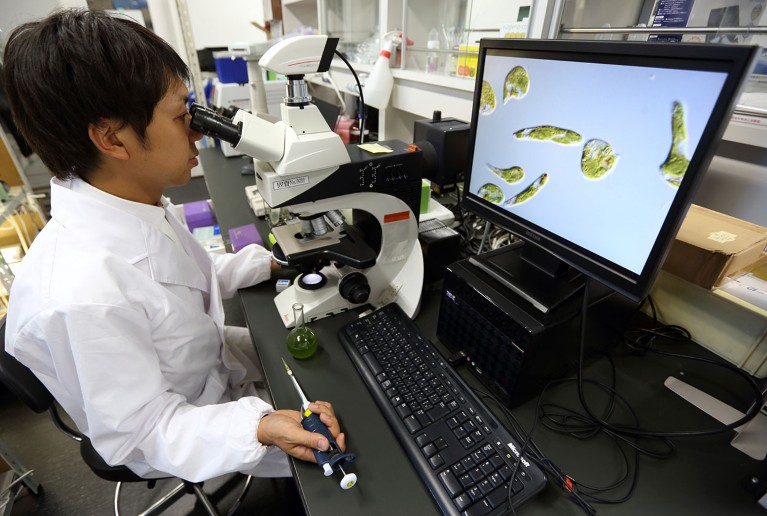
Scientists in Japan are calling for increased funding for basic research. Credit: Tomohiro Ohsumi/Bloomberg via Getty
More than 500 organizations representing hundreds of thousands of scientists in Japan have launched a petition that calls on the government to increase funds for its main scientific-grants agency.
The petition calls for greater funding for the Grants-in-Aid for Scientific Research (KAKENHI) programme.
KAKENHI has provided crucial funding for curiosity-driven research, says Kazushige Touhara, a biochemist at the University of Tokyo and president of the Union of Japanese Societies for Biological Science, one of the organizations backing the petition.
The petition describes KAKENHI as having funded studies that led to Japan’s most notable scientific achievements, including Nobel-prizewinning discoveries such as induced pluripotent stem cells .
Other grants are available for research with clear societal applications or government priority areas, but KAKENHI is Japan’s most important source of basic-science funding, Touhara says. He says KAKENHI’s funds are the only competitive grants accessible to Japanese researchers across all disciplines.
In absolute terms, the annual budget for KAKENHI has remained flat for the past decade, hovering at just under 240 billion yen (US$1.5 billion). When considering inflation and a weaker yen, the average amount allotted per project has decreased by half between 2013 and 2022 (the last year for which data are available).
“A sinking yen, rising publication costs and inflation over the past year have pushed academics over their limit,” says Yukiko Gotoh, a molecular biologist at the University of Tokyo who initiated the petition.
Declining standing
The petition comes at a time of mounting concern regarding the country’s dwindling research standing . According to a 2023 report by the Japanese Ministry of Education, Culture, Sports, Science and Technology (MEXT), Japan’s global rank in countries with the top 10% of most-cited papers, a measure of high-impact research, slid to 13th. One of the reasons for this decline, policy analysts say, is reduced funding. Whereas many high-income countries have considerably increased their research spending in the past two decades — for example, China did so by more than tenfold — Japan’s overall spending had increased only by 10% in real terms.
In an effort to arrest the decline, the Japanese government has pursued a “select and concentrate” strategy, channelling funds into a few disciplines that it thinks the country can compete in.
But Hiroshi Kimura, a cell biologist at the Tokyo Institute of Technology and a co-organizer of the petition, says that a key aim of the petition is to challenge this strategy. “There is no future in Japanese science without cultivating diverse seeds of innovation,” he says. The Japanese government is increasingly directing both KAKENHI and other grant programmes to the universities and disciplines it has selected, he says, leaving other research groups scrabbling for funds.
Touhara explains that the petition will focus on KAKENHI as a first step, because it is an achievable goal. The petition does not specify a target amount for the programme, but organizers say that when inflation and rising publication costs are taken into account, at least 480 billion yen — double the current annual budget — is needed to regain international competitiveness.
But Keitaro Ohno, a politician who serves on the Research Commission on Science, Technology and Innovation Strategy in the ruling Liberal Democratic Party, says it’s not as simple as increasing the funding pot. He says the country needs to restructure its funding mechanisms, which haven’t been revised substantially in decades. Ohno is generally supportive of more funding for scientists, but says that the KAKENHI grant programme must be considered in concert with other programmes for research funding. “Given the significant progress we have made in university reform,” he says, it’s time to “fundamentally restructure funding mechanisms instead”.
Nature has contacted the Secretariat of Science, Technology and Innovation Policy for comment on the petition and will update the story with its response.
doi: https://doi.org/10.1038/d41586-024-00942-8
Reprints and permissions
Related Articles

Japanese research leaders warn about national science decline

Scientists relieved by far-right defeat in French election — but they still face uncertainty
News 08 JUL 24

COVID tsar Patrick Vallance appointed UK science minister

UK election: scientists welcome Labour’s landslide win
News 05 JUL 24
Regulate to protect fragile Antarctic ecosystems from growing tourism
Correspondence 09 JUL 24

UK election: three research priorities for the next government
Editorial 02 JUL 24

How I’m using AI tools to help universities maximize research impacts
World View 26 JUN 24

We can make the UK a science superpower — with a radical political manifesto
World View 18 JUN 24
Neuroscience Research Assistant/Tech - Manhattan Weill Cornell Medical College
We are seeking motivated and enthusiastic research tech applicants to work on autism mouse models and brain organoids.
New York City, New York (US)
Weill Cornell Medical College
Postdoctoral Fellowship - Graph Database Developer
Postdoctoral Fellowship - Graph Database Developer Organization National Library of Medicine, National Institutes of Health, Bethesda, MD and surro...
Bethesda, Maryland
National Institutes of Health/National Library of Medicine
Postdoctoral Fellow - Boyi Gan lab
New postdoctoral positions are open in a cancer research laboratory located within The University of Texas MD Anderson Cancer Center. The lab curre...
Houston, Texas (US)
The University of Texas MD Anderson Cancer Center - Experimental Radiation Oncology
Senior Research Associates x 3 – Bioinformatician Team
The Genomics and Bioinformatics Core (GBC) within the Institute of Metabolic Science – Metabolic Research Laboratories at the Clinical School, Univers
Cambridge, Cambridgeshire
University of Cambridge
Al Medical Engineering at School of Biomedical Engineering
Tsinghua BME offers faculty positions in the emerging research direction of AI Medical Engineering
Beijing, China
Tsinghua University
Sign up for the Nature Briefing newsletter — what matters in science, free to your inbox daily.
Quick links
- Explore articles by subject
- Guide to authors
- Editorial policies
The Application for Fiscal Year 2020 was closed.
The Application Form, the Application Guide and the Instruction Sheet for Fiscal Year 2020 attached below, for your reference only.
Study and Research Opportunities in JapanFeatured opportunities in japan. The long and short-term academic programs are available in Japan across many universities and educational centers. International students and researchers may apply to BA, MA, Ph.D., and postdoctoral research programs in Japan. Moreover, summer schools and conferences are excellent academic activities that make Japan an attractive destination for scholars and scientists. Many programs also come with fully-funded scholarships and fellowships, as well as travel grants and financial aid. Thus every student, researcher, and professor can always find a suitable program in Japan and apply. Scholarship Opportunities
Fellowships
Summer programs
What does it feel like to be an international student in Japan?Japan is willing to welcome international students to their national universities. In 2003, 100,000 international students were studying in Japan, and the government set the target to increase this number to 300.000. There are adopted policies and strategies to promote the academic goodwill of the country for international students. For example, there are many course schemes taught partially or entirely in English. Also, many universities hire specific staff whose responsibility is to assist international students. Another significant aspect of convenience is that Japan organizes many exchange programs. Also, instead of the standard Japanese academic year, which starts in April, international students can start their studies from September , as accustomed in many foreign countries. You might have already explored from the above links that the Japanese government broadly supports international students by covering not only study expenses but also living and other related ones. What do you need to enter a Japanese university?The entry requirements differ per university and per program you apply to study in Japan. However, the typical approach of 95% of national universities and 65% of public universities requires EJU, which stands for Examination for Japanese University for international students for undergraduate studies. Be sure to carefully check the entry requirements, as some universities may require you to take an additional test other than EJU. The cost of those tests may vary near US$67-$125 and is offered twice a year. EJU is a standard test for assessing the students' basic academic abilities in science, math, and "Japan and the world." You may feel disappointed at this point, as exams are additional stress at the end. However, from another perspective, this test is a second chance to succeed in your academic career, even if your GPA is not high. In the case of Master's and Ph.D. programs, entry requirements are set by each university. Usually, they are assessments of academic abilities or previous academic progress. For graduate program applications, you will be required to submit a CV, research proposal, statement of purpose, recommendations, previous awards, etc. In both study levels, you might be required to pass TOEFL or IELTS if the course is taught in English, and the Japanese-language proficiency test , if the course is in Japanese. Japan UniversitiesYou have around 780 university options in Japan, the majority of which are private. The nation's strongest Universities are considered to be the University of Tokyo ( 24th in the QS World University Rankings 2021), Kyoto University (38th), and Tokyo Institute of Technology (56th). In addition to the mentioned ones, Japan has 38 universities ranked in the global university rankings for the current year. Filter the rankings by country-Japan to receive the whole list of the best Japanese universities. The oldest university of Japan is considered Komazawa University, founded in 1592 in the Tokyo Metropolis urban area. The 428-year-old Komazawa University exists up to current. It offers bachelor's, master's, and doctorate degrees in numerous study areas. Among other academic opportunities in Japan, you have the chance to apply to Komazawa, enjoying the oldest academic culture of one of the best Asian countries.

Today's print edition Home Delivery
Japanese government shortlists three universities for research institute grant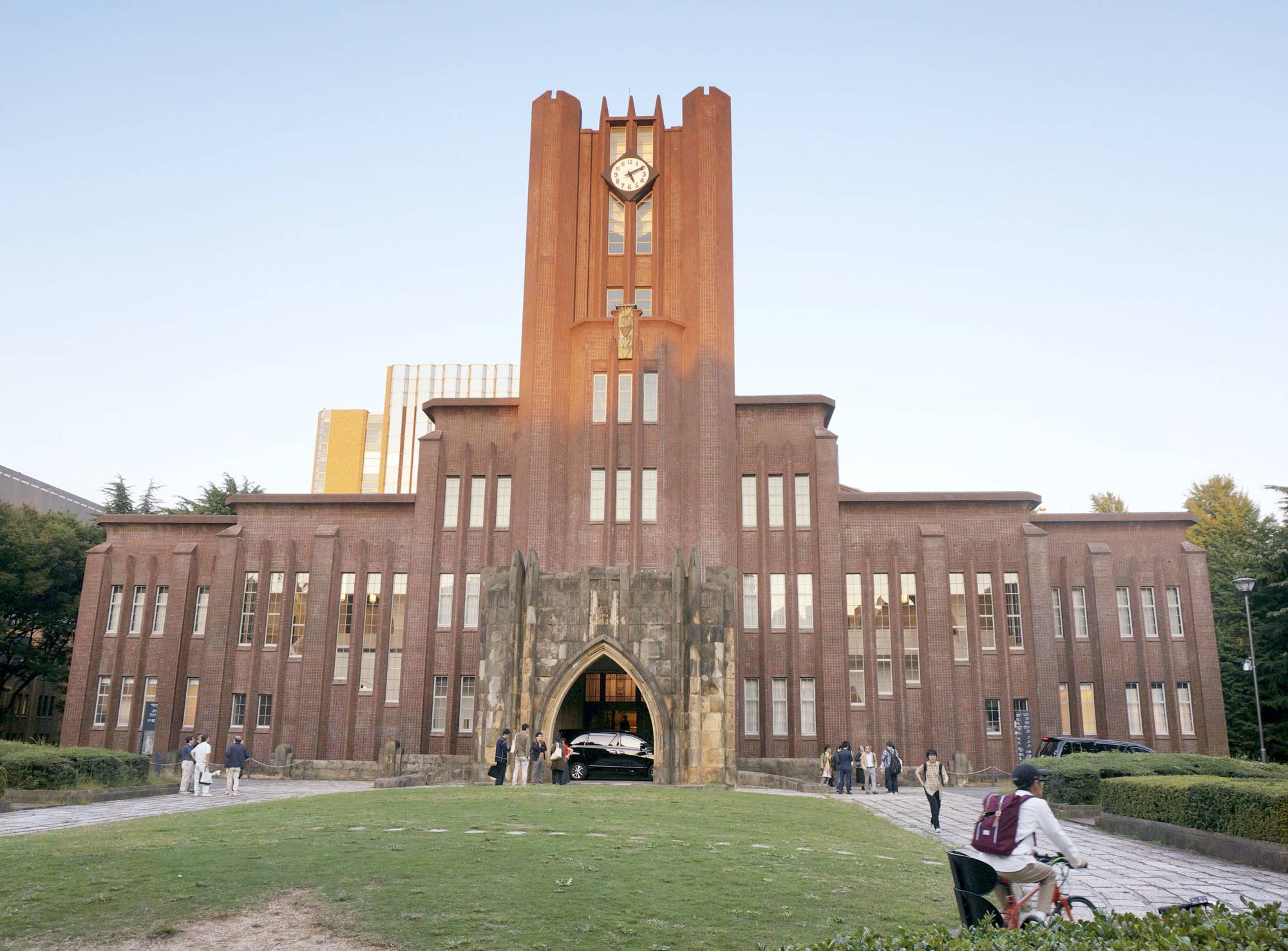 The University of Tokyo and two other national universities were chosen as candidates to be designated as world-class research institutes eligible for substantial backing from a government fund, sources familiar with the matter said Tuesday. If chosen, the schools would be eligible for grants paid out of profits generated from a ¥10 trillion ($70 billion) fund established by the government to bring Japanese institutions up to par with the world's top universities. The government is planning to raise ¥300 billion every year to provide tens of billions of yen in support to each of the designated universities annually from as early as fiscal 2024 for up to 25 years. Among the unsuccessful applicants were the University of Tsukuba, the Tokyo University of Science, Waseda University, Nagoya University, Osaka University, Kyushu University and a new national university to be formed through a merger between the Tokyo Institute of Technology and the Tokyo Medical and Dental University. The new designation system has been introduced as Japanese universities have fallen behind overseas institutions in recent years. The University of Tokyo dropped from 35th to 39th place and Kyoto University fell from 61st to 68th on an annual ranking of the world's best universities by British magazine Times Higher Education. The two were the only Japanese institutions in the top 200. 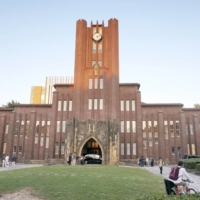 In a time of both misinformation and too much information, quality journalism is more crucial than ever. By subscribing, you can help us get the story right.
Please note that under HESA regulations only institutions contributing data to HESA are permitted to access the data mining tools. If this applies to you, and you have an account, please login to access the tools. If you do not have an account please register . Grants for UK-Japan research collaborationsYou are here. We invite applications for UK-Japan research proposals under the themes of 'transformative technologies' and 'tomorrow’s talent' supported by the Department of Science, Innovation and Technology's International Science Partnerships Fund (ISPF). Grants up to £80,000 will be available for funding under this ISPF research collaboration programme for bilateral research and innovation collaborations under the ISPF. Priorities set with Japan at the call design stage. UK Institutions will be funded at 80% of Full Economic Costs. Japan institutions will be funded at 100% FEC and must not exceed more than 30% of the overall cost of the project calculated at 100% FEC The call will fund Global Challenges Research Grants to support and facilitate research that tackles global challenges. The total funding available for this call is £560,000. Under this call for proposals, projects should consider:
Who can apply Each proposal must have one principal applicant from the UK and one principal applicant from Japan:
Please see the grant applicant guidelines for additional criteria. Indicative timeline
About the International Science Partnerships Fund The International Science Partnerships Fund is designed to enable potential and foster prosperity. It puts research and innovation at the heart of our international relationships, supporting UK researchers and innovators to work with peers around the world on the major themes of our time: planet, health, tech, and talent. The fund is managed by the Department for Science, Innovation and Technology and delivered by a consortium of the UK’s leading research and innovation bodies, which includes: UK Research and Innovation (comprising the 7 research councils, Innovate UK and Research England), the UK Academies, the British Council, the Met Office, the National Physical Laboratory, the UK Atomic Energy Authority, and Universities UK International. Equality, diversity and inclusion The British Council is committed to equality, diversity, and inclusion, and to continuing to attract and nurture talented people from the widest pool to remain internationally competitive in research and innovation. We believe that everyone has a right to be treated with dignity and respect, and to be provided with equal opportunities to flourish and succeed. This includes avoidance of bias due to disability, gender reassignment, marriage or civil partnership status, pregnancy and maternity, race, religion or belief, sexual orientation, sex (gender), and age. The British Council is committed to equal opportunities and diversity and will consider, on a case-by-case basis, requests for support to encourage underrepresented groups to engage in ISPF activity, so long as sufficient justification is provided. Action RequiredHow to apply: UK Project leaders must register on the website grant.britishcouncil.org . Applications will only be accepted through this website. If you require an alternative format for reasons of accessibility, please contact us at [email protected] . The British Council approach to funding (grant agreement form) and a list of eligible UK Research Organisations can be found here .
Related opportunities Gender Equality Partnerships 2024–25 Disability Inclusion Partnerships Upcoming grant calls from Going Global PartnershipsSign up to our newsletter. Keep up to date with the latest news from the British Council.  Footer menu
© 2023 British Council The United Kingdom's international organisation for cultural relations and educational opportunities. A registered charity: 209131 (England and Wales) SC037733 (Scotland). Grants-in-Aid for Scientific ResearchHandbook for researchers. 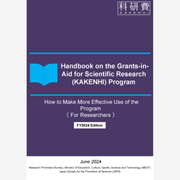 Ohio State nav barThe Ohio State University
 U.S., Japan researchers analyze small business disaster resilienceGlenn college experts join team aimed at helping companies rebound from catastrophic events. Noah Dormady , associate professor in the John Glenn College of Public Affairs at The Ohio State University, has joined a research team studying resilience for minority- and women-owned small and mid-sized businesses in the U.S. and Japan. Supported by about $1 million in grants from the National Science Foundation and Japanese Science and Technology Agency, the binational team brings together leading experts in hazard resilience and economics to improve understanding of how these essential businesses rebound and recover from catastrophic events. “As someone who studies natural hazards and natural hazard economics, and as the associate editor of the Natural Hazards Review , I am intrigued by Japan, as its people have many frequent natural hazard events such as earthquakes and tsunamis and yet bounce back with a resilience that is worthy of study,” Dormady said. Results of the research are expected to improve equity and resilience capacity-building in regard to the disproportionate consequences of natural disasters on small and mid-sized businesses. “Through our similar work studying business resilience outcomes from Hurricane Harvey and Superstorm Sandy, we found that … some businesses were hit harder than others, and some of those hit hard rebounded effectively, while others did not,” Dormady said. “I am looking forward to digging deeper to evaluate which types of businesses are hit most hard and which types of businesses have the most cost-effective resilience outcomes.” In prior work funded by the U.S. Department of Homeland Security, the team developed methods to quantify business resilience to disruptions brought about by disasters. The new funding will enable the team to further evaluate resilience cost and effectiveness, develop greater predictive capabilities and focus more on efficient recovery. The team aims to develop enhanced analytics that will help all businesses more cost-effectively cope with and rebound from disasters. According to the U.S. Small Business Administration, 33.2 million small businesses represent over 99% of firms in total and provide employment for nearly half of the national workforce. When disasters strike, these businesses provide essential and community support services, economic vitality and employment stability for populations and communities when it is needed most. “Considerable volumes of research are devoted to studying community resilience, and we understand how vital small and mid-sized businesses are to community resilience, yet only a tiny fraction of the overall research effort is devoted to understanding the factors that drive resilience in these essential businesses,” said research team leader Alfredo Roa-Henriquez, a Glenn College doctoral graduate formerly advised by Dormady who is now an assistant professor of supply chain management at North Dakota State University. “Even less is known about disaster recovery for minority- and women-owned and operated businesses, which can be slower to recover or more likely to permanently close because of unique barriers they face, such as limited access to capital, challenging labor disruptions and business development issues,” Roa-Henriquez added. The U.S. researchers on the project will survey businesses affected by Hurricane Ian in Florida in 2022 and analyze data to better understand how they cope and recover from catastrophic events. “For businesses, dynamic resilience is about optimal timing of investments in repair and reconstruction,” Dormady said. In addition to Dormady and Roa-Henriquez, other experts on the team are Adam Rose, a professor at the Sol Price School of Public Policy at the University of Southern California, who was Dormady’s doctoral adviser, and Maria Watson, an Ohio State graduate in urban planning who is an assistant professor at the Shimberg Center for Housing Studies at the University of Florida. The advantage of the international collaboration will be the construction of a common U.S.-Japan business resilience analysis framework and the test of its effectiveness in different cultural contexts. The team’s Japanese partners come from Kyoto University’s Disaster Prevention Research Institute and Kagawa University. They will focus on the degree to which labor shortages, working environment and dependency on migrant workers impact business recovery from disasters, as well as on an analysis of businesses that employ foreign guest workers. Over the two-year project, the U.S. research team will distribute its findings locally and nationally through the National Women’s Business Development Council, the National Center for the Middle Market at Ohio State, and other federal, state and local agencies and policymakers. More Ohio State NewsBuckeyes swimmer alex axon eager to dive into olympic games. Olympian and Ohio State Buckeyes swimmer Alex Axon is prepping for the 2024 Paris Games, where he’ll compete as part of Team Canada beginning July 26. Ohio State safety director discusses community partnershipsThe Chronicle of Higher Education recently featured The Ohio State University’s public safety director Monica Moll in an article that delves into challenges faced by college police forces, and their unique responses. Moll’s decades of experience provide stability while still encouraging innovation amidst the evolving landscape of campus safety. Ohio State to lead $10 million effort to accelerate climate-smart farm solutions Contact: Admissions | Webmaster | Page maintained by University Communications Request an alternate format of this page | Web Services Status | Nondiscrimination notice  | |||||||||||||||||||||||||||||||||||||||||||||||
IMAGES
VIDEO
COMMENTS
From FY1999, some functions of the Grants-in-Aid program were transferred to JSPS from Monbusho (now Monbu Kagakusho [Ministry of Education, Culture, Sports, Science and Technology (MEXT)]). This Handbook has been prepared primarily for researchers who are using Grants-in-Aid for Scientific Research (KAKENHI) or who are planning to apply for ...
Creative/pioneering research conducted by one or a relatively small number of researchers. 5 years (in principle) 50 million to 200 million yen. SG. Grant-in-Aid for Scientific Research (A) Creative/pioneering research conducted by one researcher or jointly by multiple researchers. (A) 3 to 5 years 20 million to 50 million yen.
Strategic Program 《Offering was ended》. Young and excellent pre-/post-doctoral researchers with high future potential from selected countries are strategically invited to Japan for the period of two to twelve months in order to build collaborative research relationships with Japanese colleagues.
Funding Agency: JST (Japan Science and Technology Agency). CREST promotes world-class basic research to overcome critical challenges facing Japan and to create creative and outstanding seeds of innovative technologies that will contribute significantly to social and economic transformation. PRESTO promotes original, challenging, and internationally high-level pioneering basic research (solo ...
The Negotiation of Burakumin Identity in Contemporary Japan. Step 2. Register for an account on Grants.gov. Step 3. Complete your application package. Step 4. Submit your application package on Grants.gov. Step 5. Verify you have received email messages from Grants.gov.
Program. The annual Inamori Research Grants Program was launched in 1985 to support research works by scholars in Japan with the aim of fostering human resources capable of contributing to the future of human society. Recipients are chosen from a wide range of research areas, across the fields of the natural, human, and social sciences.
Funding Programs. As a network-based research institute, JST takes the initiative to promote research and development activities linked to innovation, and tackles economic and social issues through the practical application of its research output as well as international collaborative research. Strategic Basic Research.
The Japan-United States Educational Commission (Fulbright Japan) offers approximately 30 to 40 Fulbright grants for Japanese citizens to study or conduct research in the U.S. in the fields listed below. All awards are subject to budget appropriations from the governments of Japan and the United States. Grants are for the 2025-2026 JUSEC program ...
This program provides support to outstanding scholars, researchers, and professionals in the field by offering the opportunity to conduct research in Japan. NOTE: For applicants who are non-U.S citizens or permanent residents, please visit the Japan Foundation Headquarters. 2024-2025 Fellowship Categories
Database of Grants-in-Aid for Scientific Research (KAKEN) is a public database which includes information on adopted projects, assessment, and research achievements from the Grants-in-Aid for Scientific Research (KAKENHI) Program. This system is hosted by the National Institute of Informatics (NII)in cooperation with MEXT and JSPS.
This grant is aimed at identifying, nurturing, and supporting promising young non-Japanese researchers in the fields of humanities and social sciences, and contributing to greater academic exchanges and mutual understanding between Japan and the rest of the world. (residents of japan only) The Foundation will continue to pursue the aims for ...
(3) Supplying Research-Encouragement Funding and Disbursing Grants-in-Aid for Scientific Research Funding is provided to doctoral students and postdoctoral researchers to encourage their research under the Japan Society for the Promotion of Science (JSPS)'s Research Fellowships for Young Scientists.
This award program identifies and funds outstanding research proposals in low- or middle-income countries with high potential for excellence in research and clear policy implications for addressing development issues. The three winning projects will receive grants worth US$ 60,000. The awards will be given to the researcher (s) whose proposals ...
The United States-Japan Foundation is currently accepting applications for 2024 grants. The deadline for submitting letters of inquiry (LOIs) is Friday, June 28, 2024. We will announce final decisions by Monday, December 2. Please email your LOI to [email protected].
Funding amount and funding period. (1) Funding amount. JPY 300,000 per research (*2,350 € per project for applicants living in Europe) Number of funding awards: 4 (prospective) (2) Funding period. The 10 months from April 1, 2024 to January 31, 2025. For details, please visit the website of the Foundation and read through "Fiscal Year 2024 ...
As an extension of the "Grants for Japan-Related Research Projects", The Sumitomo Foundation has selected cross-sectional themes from the research result reports of past grant recipients. With the aim of creating opportunities to present and share research results and interact with people who are active in the same field. It was held online.
Awarded for important, original research in the basic natural sciences. Special areas of focus are fixed, but grants are also awarded to research outside those areas. In principle, research should be conducted by individuals (including small groups). Applicants should be residents of Japan and have fixed research bases in Japan.
Other grants are available for research with clear societal applications or government priority areas, but KAKENHI is Japan's most important source of basic-science funding, Touhara says.
About the Program. 1. Program overview. The Japan Society for the Promotion of Science (JSPS) carries out programs that provide excellent researchers from other countries an opportunity to conduct collaborative research, discussions, and opinion exchanges with researchers in Japan. These programs are intended to help advance the overseas ...
The program aims at enhancing mutual understanding between Asian countries and Japan through promoting research projects in the field of the social sciences or humanities that are related to Japan. Eligible Projects for Application: ... You can open the grants list below. Research Projects Awarded in Fiscal 2020: Research Projects Awarded in ...
Listing of scholarships in Japan as well as summer schools, conferences and study programs. Find fellowships, research grants, BA, MA, PhD study opportunities and postdocs in Japan. Browse academic, educational and professional opportunities available in Japan.
The decision will be finalized in the fall after on-site inspections. If chosen, the schools would be eligible for grants paid out of profits generated from a ¥10 trillion ($70 billion) fund ...
Summer Program. Young pre-/post-doctoral researchers from the US, the UK, France, Germany, Canada, and Sweden are invited to Japan over a period of two months during the summer to pursue research under the guidance of host researchers in universities and research institutions in Japan. Strategic Program Offering was ended.
Grants up to £80,000 will be available for funding under this ISPF research collaboration programme for bilateral research and innovation collaborations under the ISPF. Priorities set with Japan at the call design stage. UK Institutions will be funded at 80% of Full Economic Costs.
Handbook for Researchers. This Handbook is intended mainly for researchers who are conducting research with financial assistance from the Grants-in-Aid for Scientific Research (KAKENHI) program or intend to apply for a research grant under the program. The basics of the program are outlined here in an accessible format. e-book (English)
Noah Dormady, associate professor in the John Glenn College of Public Affairs at The Ohio State University, has joined a research team studying resilience for minority- and women-owned small and mid-sized businesses in the U.S. and Japan.Supported by about $1 million in grants from the National Science Foundation and Japanese Science and Technol...